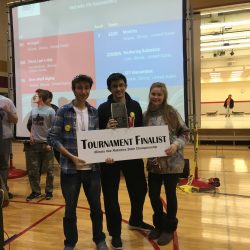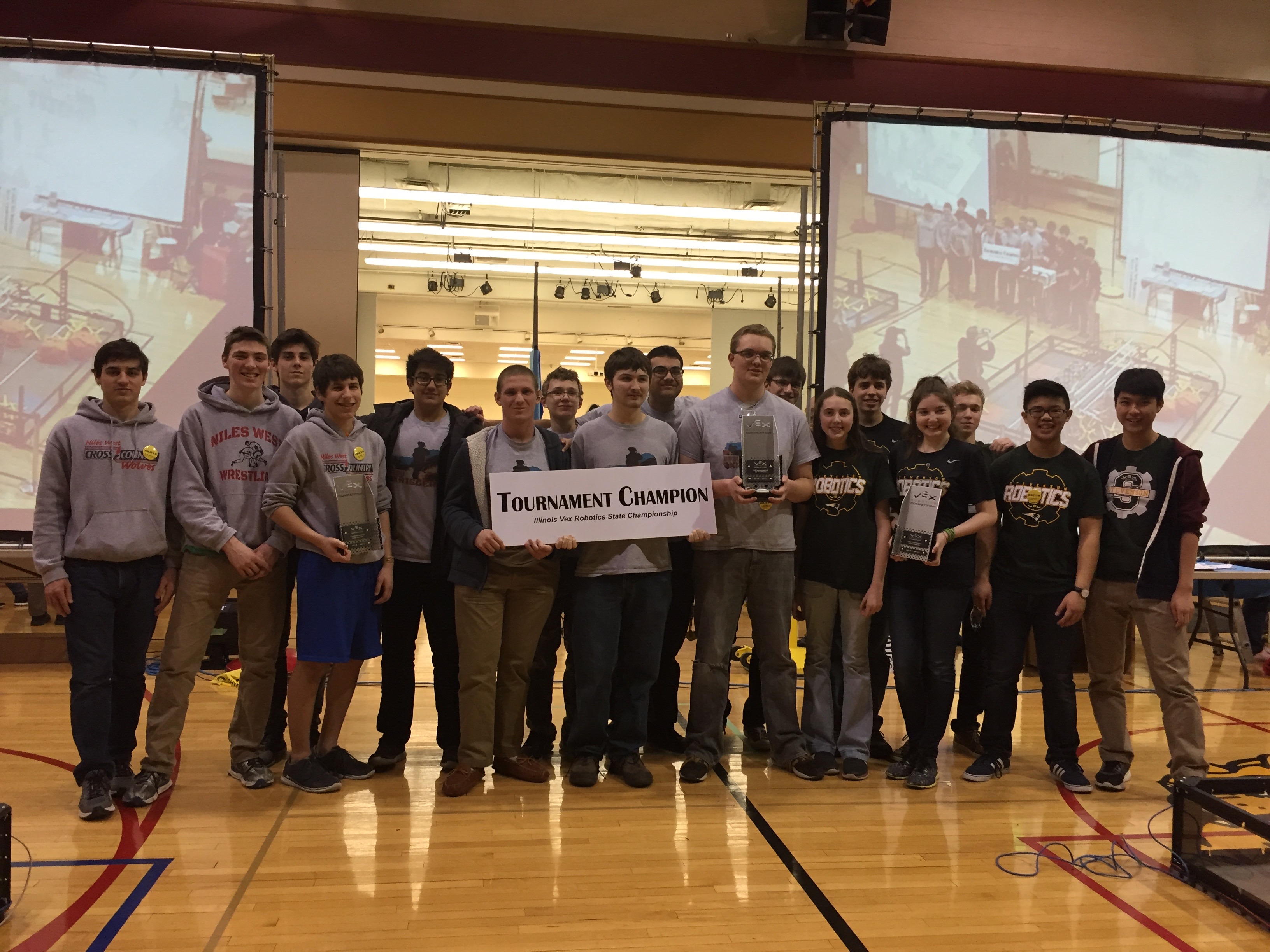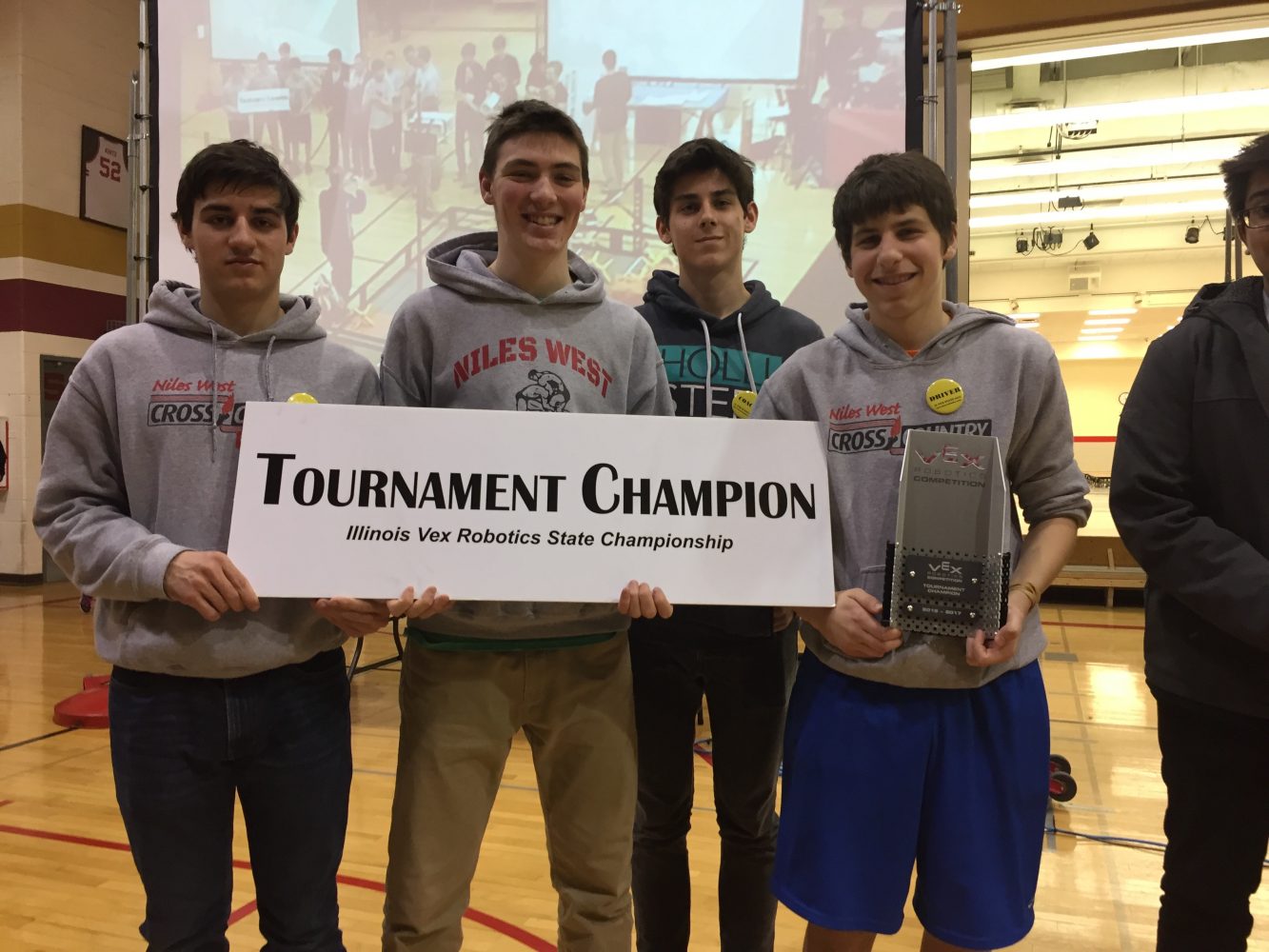Members of Niles West’s VEX Robotics Team are advancing to the VEX Robotics World Championship and will head down to Louisville, Kentucky between Wednesday, April 19 and Saturday, April 22 to compete head-to-head against teams from all over the world.
After winning their first state championship title on Saturday, March 11 at Rotolo Middle School in Batavia, Illinois, Robotics Club, which has only been in existence for three years, has found rapid success. The club is made up of several smaller teams that have been working together throughout the year to build robots that compete in an engineering challenge determined by the VEX Robotics organization. Two of West’s teams qualified for Worlds this year: Team 321A, which includes juniors Adam Majcher, Robert Majcher, Patrick O’Dwyer, Ethan Moldofsky, and Jay Monga; and team 321H, which includes senior Michael Leon and juniors John Mitchell, Katia Teryokhina, Alen Cvitanovic, and Dennis Angelov.

This year’s robotics challenge, called Starstruck, sees robots compete to score the most points possible by getting stars across a barrier and into certain point zones. The robots must be pre-programmed to function on their own and score points without the help of their driver for the first part of the challenge; after this short period, teams control their robots by remote to score as many points as possible before time is up.
The state competition began with a series of qualification rounds, where teams were matched up in a random alliance with another competing team, then worked together against another two-team alliance.
“There were about 36 teams from all over Illinois. Before the semifinals, each team competed with other different teams seven times. These rounds helped the judges rank the robots. During those seven times, you get a random alliance. You can even go against a team from your own school,” team 321H member Teryokhina explained.
The semifinals are where things get interesting. Instead of random alliances, the top eight teams from the qualifying rounds are able to choose two other teams to work with.
“The best teams usually have people that scout [during the qualification rounds], so they sit in the stands and watch all the matches and take notes on other teams and their bots, so when they have to pick, they know which ones are actually good,” robotics club member Priyal Soni explained.
The qualification rounds turned out to be quite a challenge for West’s teams.
“We [team 321A] finished our qualification rounds with a record of 2-5. Out of 36 teams, we ranked 33rd in the qualification matches due to technical difficulties but were selected in the elimination rounds by a team from Niles North,” Moldofsky said.
In contrast to the heated rivalry between West and North in other athletic and academic competitions, the alliance system and Niles North’s choice to form an alliance with Niles West allowed team 321A to stay in the competition. While reflecting on the outcome of the state competition, Robotics Club sponsor and engineering teacher Tim Sullivan acknowledged North’s role in the win.
“I need to recognize Niles North for their partnered success across the season and at state,” Sullivan said. “We won with them, and personally, I couldn’t be more proud of that in times when things seem so divided.”

Together, the alliance of North’s and West’s teams and a team from Stevenson High School were able to take home the title of State Champions, earning them all a bid to the VEX Robotics World Championship. And although they didn’t win a title, West’s other team, 321H, also earned a bid to the world championship in an alliance with another Niles North team and a team from Benet Academy.
Overcoming technical difficulties on the fly is one of the most challenging parts of competition, and the robotics members know exactly what they need to fix for future competitions.
“For some reason, my bot drains battery like there’s no tomorrow, so it slows down by the end of a match, which sucks,” Soni explained. “We had several smaller problems throughout state, but they all got fixed in time for new problems to arise, as usual. I’d also probably work on driving the bot because that’s half the battle.”
With the world championship quickly approaching, teams 321A and 321H are working hard to iron out difficulties and improve their performance in competition.
“Between now and worlds, we mostly just want to practice so that we can be ready for the higher levels of competition that we expect to be there,” Moldofsky said.
Stay tuned to see how our Wolves fare at worlds later this month when they take on the best of the best from around the world.


